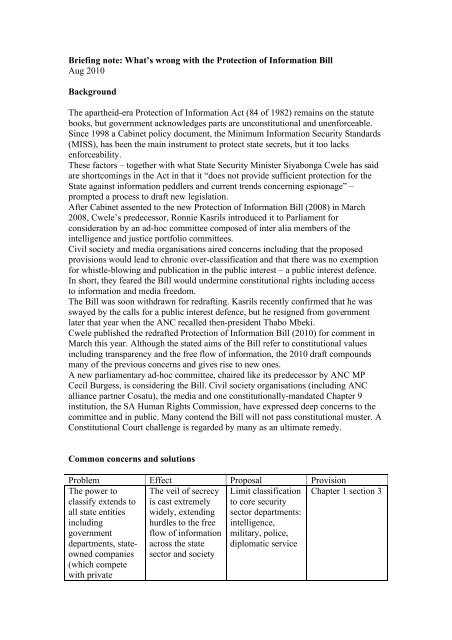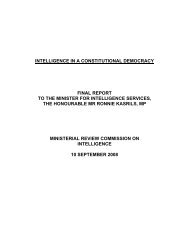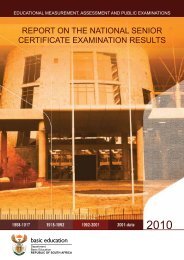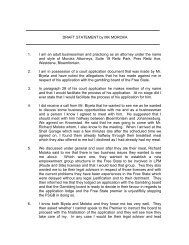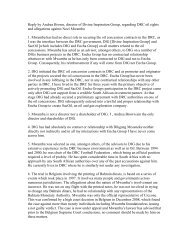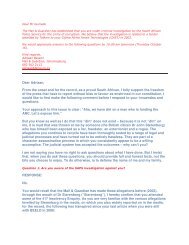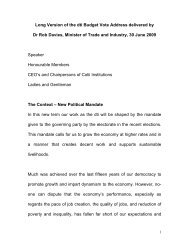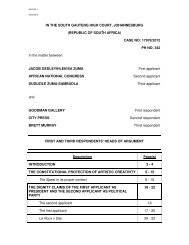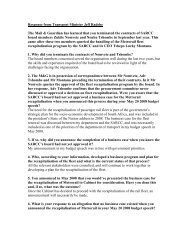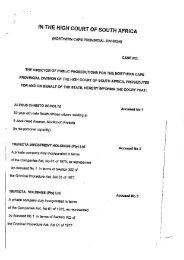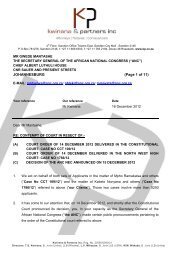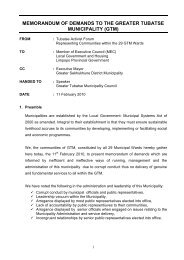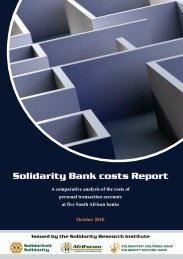Briefing note-What's wrong with the Protection of Information Bill - Mg
Briefing note-What's wrong with the Protection of Information Bill - Mg
Briefing note-What's wrong with the Protection of Information Bill - Mg
Create successful ePaper yourself
Turn your PDF publications into a flip-book with our unique Google optimized e-Paper software.
<strong>Briefing</strong> <strong>note</strong>: What’s <strong>wrong</strong> <strong>with</strong> <strong>the</strong> <strong>Protection</strong> <strong>of</strong> <strong>Information</strong> <strong>Bill</strong><br />
Aug 2010<br />
Background<br />
The apar<strong>the</strong>id-era <strong>Protection</strong> <strong>of</strong> <strong>Information</strong> Act (84 <strong>of</strong> 1982) remains on <strong>the</strong> statute<br />
books, but government acknowledges parts are unconstitutional and unenforceable.<br />
Since 1998 a Cabinet policy document, <strong>the</strong> Minimum <strong>Information</strong> Security Standards<br />
(MISS), has been <strong>the</strong> main instrument to protect state secrets, but it too lacks<br />
enforceability.<br />
These factors – toge<strong>the</strong>r <strong>with</strong> what State Security Minister Siyabonga Cwele has said<br />
are shortcomings in <strong>the</strong> Act in that it “does not provide sufficient protection for <strong>the</strong><br />
State against information peddlers and current trends concerning espionage” –<br />
prompted a process to draft new legislation.<br />
After Cabinet assented to <strong>the</strong> new <strong>Protection</strong> <strong>of</strong> <strong>Information</strong> <strong>Bill</strong> (2008) in March<br />
2008, Cwele’s predecessor, Ronnie Kasrils introduced it to Parliament for<br />
consideration by an ad-hoc committee composed <strong>of</strong> inter alia members <strong>of</strong> <strong>the</strong><br />
intelligence and justice portfolio committees.<br />
Civil society and media organisations aired concerns including that <strong>the</strong> proposed<br />
provisions would lead to chronic over-classification and that <strong>the</strong>re was no exemption<br />
for whistle-blowing and publication in <strong>the</strong> public interest – a public interest defence.<br />
In short, <strong>the</strong>y feared <strong>the</strong> <strong>Bill</strong> would undermine constitutional rights including access<br />
to information and media freedom.<br />
The <strong>Bill</strong> was soon <strong>with</strong>drawn for redrafting. Kasrils recently confirmed that he was<br />
swayed by <strong>the</strong> calls for a public interest defence, but he resigned from government<br />
later that year when <strong>the</strong> ANC recalled <strong>the</strong>n-president Thabo Mbeki.<br />
Cwele published <strong>the</strong> redrafted <strong>Protection</strong> <strong>of</strong> <strong>Information</strong> <strong>Bill</strong> (2010) for comment in<br />
March this year. Although <strong>the</strong> stated aims <strong>of</strong> <strong>the</strong> <strong>Bill</strong> refer to constitutional values<br />
including transparency and <strong>the</strong> free flow <strong>of</strong> information, <strong>the</strong> 2010 draft compounds<br />
many <strong>of</strong> <strong>the</strong> previous concerns and gives rise to new ones.<br />
A new parliamentary ad-hoc committee, chaired like its predecessor by ANC MP<br />
Cecil Burgess, is considering <strong>the</strong> <strong>Bill</strong>. Civil society organisations (including ANC<br />
alliance partner Cosatu), <strong>the</strong> media and one constitutionally-mandated Chapter 9<br />
institution, <strong>the</strong> SA Human Rights Commission, have expressed deep concerns to <strong>the</strong><br />
committee and in public. Many contend <strong>the</strong> <strong>Bill</strong> will not pass constitutional muster. A<br />
Constitutional Court challenge is regarded by many as an ultimate remedy.<br />
Common concerns and solutions<br />
Problem Effect Proposal Provision<br />
The power to The veil <strong>of</strong> secrecy Limit classification Chapter 1 section 3<br />
classify extends to is cast extremely to core security<br />
all state entities widely, extending sector departments:<br />
including<br />
hurdles to <strong>the</strong> free intelligence,<br />
government flow <strong>of</strong> information military, police,<br />
departments, state- across <strong>the</strong> state diplomatic service<br />
owned companies<br />
(which compete<br />
<strong>with</strong> private<br />
sector and society
companies),<br />
provincial and local<br />
authorities<br />
“National security”<br />
considerations<br />
override<br />
democratic rights<br />
Key consideration<br />
in classification<br />
decisions is <strong>the</strong><br />
“national interest”<br />
very broadly<br />
defined<br />
Commercial info<br />
(<strong>of</strong>ten 3rd party<br />
info) in hands <strong>of</strong><br />
state is subject to<br />
classification if<br />
state or 3rd-party<br />
interest may be<br />
prejudiced by<br />
disclosure<br />
Officials can<br />
classify en-bloc,<br />
and <strong>with</strong>out<br />
recording reasons<br />
for classification<br />
decisions at time <strong>of</strong><br />
classification<br />
Classification<br />
levels determined<br />
by speculative<br />
levels <strong>of</strong> harm <strong>with</strong><br />
low thresholds (e.g.<br />
“may be harmful”)<br />
Minister <strong>of</strong> State<br />
Security, whose<br />
business is secrecy,<br />
made arbiter <strong>of</strong><br />
classification and<br />
declassification<br />
decisions<br />
Extremely heavy<br />
penalties <strong>of</strong> up to<br />
25 years;<br />
Classifiers obliged<br />
to give precedence<br />
to state security<br />
over all rights;<br />
ignores rights as<br />
key component <strong>of</strong><br />
human security<br />
Chronic and<br />
widespread overclassification<br />
likely<br />
Veil <strong>of</strong> secrecy can<br />
be drawn over e.g.<br />
public tender<br />
processes,<br />
undermining clean<br />
and accountable<br />
government and<br />
exposure <strong>of</strong><br />
corruption<br />
Chronic and<br />
widespread overclassification<br />
likely<br />
Fur<strong>the</strong>r bias<br />
towards secrecy, no<br />
independent<br />
oversight<br />
Fur<strong>the</strong>r bias<br />
towards secrecy, no<br />
independent<br />
oversight<br />
Unusually harsh<br />
punishment;<br />
compounds chilling<br />
Remove override to<br />
harmonise <strong>with</strong><br />
constitutional<br />
values<br />
Use strictly-defined<br />
“national security”<br />
as key<br />
consideration in<br />
classification<br />
decisions<br />
Leave protection <strong>of</strong><br />
commercial<br />
information to<br />
existing law.<br />
Classify<br />
commercial info<br />
only if justified<br />
under general<br />
provisions <strong>of</strong> <strong>Bill</strong><br />
relating to national<br />
security<br />
Case-by-case<br />
classification<br />
decisions <strong>with</strong><br />
contemporaneous<br />
recordal <strong>of</strong> reasons<br />
Firm up test, e.g.<br />
“could reasonably<br />
be expected to<br />
cause demonstrable<br />
harm”<br />
Chapter 9 oversight<br />
body necessary<br />
Consider<br />
international<br />
standards<br />
Ch 1 s6 and s6(j) in<br />
particular<br />
Ch 5 s11<br />
Ch 5 s12<br />
Ch 6 s14<br />
Ch 6 s15<br />
Ch 6 s17(e), Ch 7<br />
s21(3), Ch 10 s30<br />
& 31<br />
Ch 11
prescribed<br />
minimum sentences<br />
<strong>of</strong>ten <strong>with</strong>out <strong>the</strong><br />
option <strong>of</strong> a fine<br />
“Spying” and<br />
“hostile activity”<br />
<strong>of</strong>fences do not<br />
require an intention<br />
on <strong>the</strong> part <strong>of</strong> <strong>the</strong><br />
<strong>of</strong>fender to benefit<br />
ano<strong>the</strong>r state or to<br />
prejudice <strong>the</strong> South<br />
African state – <strong>the</strong>y<br />
merely require that<br />
<strong>the</strong> <strong>of</strong>fender “ought<br />
to have suspected”<br />
that <strong>the</strong> breach <strong>of</strong><br />
classified info<br />
would have that<br />
effect “directly or<br />
indirectly”.<br />
Penalties <strong>of</strong> up to<br />
25 years<br />
Simple possession<br />
or disclosure <strong>of</strong><br />
classified<br />
information is<br />
criminalised for<br />
any person, not just<br />
for those on whom<br />
<strong>the</strong>re is an original<br />
duty to protect<br />
classified info<br />
Simple possession<br />
or disclosure even<br />
<strong>of</strong> information not<br />
formally classified<br />
can be penalised by<br />
imprisonment <strong>of</strong> up<br />
to 15 years (refer to<br />
next 2 entries)<br />
effect on free flows<br />
<strong>of</strong> info<br />
Can ensnare<br />
whistleblowers or<br />
journalists where<br />
<strong>the</strong> state alleges <strong>the</strong><br />
breach <strong>of</strong> classified<br />
info prejudiced <strong>the</strong><br />
state or benefited<br />
ano<strong>the</strong>r state – even<br />
if it is a by-product<br />
<strong>of</strong> an o<strong>the</strong>rwise<br />
well-intentioned<br />
action. Chilling<br />
effect on civil<br />
society and media<br />
exposure <strong>of</strong><br />
corruption etc<br />
International best<br />
practice stems<br />
leakage <strong>of</strong> secrets<br />
at source (present<br />
and former state<br />
<strong>of</strong>ficials entrusted<br />
<strong>with</strong> secrets). This<br />
<strong>Bill</strong> places hurdles<br />
throughout society,<br />
penalising exposure<br />
even once <strong>the</strong> horse<br />
has bolted. Free<br />
information flows<br />
and speech are<br />
curbed. Publication<br />
appears a bigger<br />
concern than<br />
exposure to hostile<br />
forces<br />
Likely to induce<br />
self-censorship and<br />
fur<strong>the</strong>r chill free<br />
flows <strong>of</strong> info due to<br />
grave uncertainty<br />
what constitutes a<br />
crime<br />
At very least<br />
require an intention<br />
to benefit ano<strong>the</strong>r<br />
state/prejudice <strong>the</strong><br />
South African state<br />
Apply penalties<br />
only to those who<br />
have an original<br />
duty to protect info<br />
(but subject to<br />
public interest<br />
defence in case <strong>of</strong><br />
whistleblowing –<br />
see below)<br />
Apply penalties<br />
only where<br />
information is<br />
formally classified<br />
Ch 11 s32 & 33<br />
Ch 11 s37-39<br />
Ch 11 s38 & 43
<strong>Bill</strong> is made<br />
contiguous <strong>with</strong><br />
Promotion <strong>of</strong><br />
Access to<br />
<strong>Information</strong> Act<br />
(PAIA), meaning<br />
categories <strong>of</strong> info<br />
<strong>the</strong> state nominally<br />
must refuse in <strong>the</strong><br />
course <strong>of</strong> PAIA<br />
requests become a<br />
criminal <strong>of</strong>fence<br />
(3-5 years) for any<br />
person to disclose,<br />
regardless <strong>of</strong><br />
whe<strong>the</strong>r classified<br />
Complete<br />
immunity from<br />
exposure for State<br />
Security Agency<br />
(NIA and SASS).<br />
Disclosure <strong>of</strong> any<br />
“state security<br />
matter” – i.e. any<br />
matter “dealt <strong>with</strong>”<br />
Catergories<br />
including personal<br />
info, 3rd-party<br />
commercial info<br />
and info relating to<br />
defence,<br />
international<br />
relations and public<br />
body economic<br />
interests (i.e.<br />
categories<br />
potentially wider<br />
than what may be<br />
classified under <strong>the</strong><br />
<strong>Bill</strong>) are protected<br />
from disclosure<br />
regardless <strong>of</strong><br />
whe<strong>the</strong>r formally<br />
classified.<br />
Introduces grave<br />
uncertainty over<br />
what may be<br />
disclosed, on pain<br />
<strong>of</strong> jail. Likely to<br />
induce self<br />
censorship<br />
throughout society.<br />
Again places<br />
commercial and<br />
personal privacies<br />
best covered by<br />
ordinary law under<br />
<strong>the</strong> operation <strong>of</strong><br />
national security<br />
legislation <strong>with</strong><br />
harsh penalties.<br />
Ignores <strong>the</strong> wide<br />
interpretive and<br />
discretionary<br />
boundaries <strong>of</strong><br />
PAIA<br />
Public oversight<br />
over <strong>the</strong> agency<br />
effectively banned;<br />
potential<br />
censorship <strong>of</strong> any<br />
o<strong>the</strong>r matter where<br />
<strong>the</strong> agency claims it<br />
is a matter <strong>with</strong>in<br />
its remit; induces<br />
Scrap provision Ch 11 s38 read<br />
<strong>with</strong> ch 5<br />
s(11)(3)(g)<br />
Scrap provision Ch 11 s43 read<br />
<strong>with</strong> definition <strong>of</strong><br />
“state security<br />
matter”
y it or “relating to<br />
its functioning” –<br />
attracts penalties up<br />
to 15 years,<br />
regardless <strong>of</strong><br />
whe<strong>the</strong>r <strong>the</strong> info is<br />
in material form or<br />
not, classified or<br />
not<br />
Provisions forcing<br />
new protections<br />
when classified<br />
information is<br />
submitted as<br />
evidence in court.<br />
Hearings regarding<br />
whe<strong>the</strong>r info to be<br />
disclosed in court<br />
are to be held in<br />
secret<br />
<strong>Bill</strong> is not<br />
synchronised <strong>with</strong><br />
whistleblower<br />
legislation<br />
(Protected<br />
Disclosures Act)<br />
and public interest<br />
overrides in <strong>the</strong><br />
Promotion <strong>of</strong><br />
Access to<br />
<strong>Information</strong> Act.<br />
The <strong>Bill</strong> trumps <strong>the</strong><br />
protection <strong>the</strong>se<br />
Acts afford to <strong>the</strong><br />
disclosure <strong>of</strong> crime,<br />
abuse <strong>of</strong> power,<br />
threats to public<br />
safety, etc<br />
grave uncertainty<br />
and self-censorship<br />
as extremely harsh<br />
penalties apply to<br />
<strong>the</strong> disclosure <strong>of</strong><br />
information not<br />
necessarily<br />
formally classified<br />
or even in material<br />
form<br />
Ordinary discretion<br />
<strong>of</strong> courts and<br />
principles <strong>of</strong> open<br />
justice undermined;<br />
justice cannot be<br />
seen to be done<br />
Possession and<br />
disclosure <strong>of</strong><br />
classified (and<br />
potentially some<br />
unclassified) info is<br />
penalised by <strong>the</strong><br />
same heavy<br />
penalties <strong>of</strong> up to<br />
25 years even<br />
where <strong>the</strong> intention<br />
is to expose e.g.<br />
corruption or<br />
environmental<br />
threats. Serious<br />
disincentive to<br />
whistleblowing and<br />
investigative<br />
journalism<br />
Restore judicial<br />
discretion including<br />
whe<strong>the</strong>r to have<br />
any portion <strong>of</strong> a<br />
hearing in camera<br />
Include a public<br />
interest defence,<br />
consistent <strong>with</strong><br />
existing law, where<br />
unauthorised<br />
possession and<br />
disclosure is<br />
intended to serve<br />
<strong>the</strong> public interest<br />
Ch 12 s46<br />
General<br />
Prepared by <strong>the</strong> M&G Centre for Investigative Journalism as a public service.


